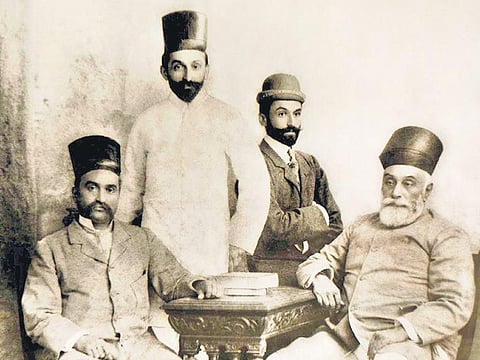

In the prologue to her book The Tatas, Freddie Mercury & Other Bawas: An Intimate History of the Parsis, Coomi Kapoor recounts a well-known legend about the first Parsis to reach India.
Fleeing persecution in their native Persia (which had fallen to the Arabs in 642 CE, leading to an Arab drive to convert Persians to Islam), a group of Zoroastrians set sail for India. Washing up in Sanjan, a port in Gujarat, they approached the local ruler, Jadi Rana, for sanctuary.
On Jadi Rana's refusal - he said there was no more space in his land to accommodate refugees - the priest who headed the group asked for a cup filled to the brim with milk. To this, he added sugar (without making the milk spill over), and demonstrated what the Zoroastrians would be like to India: sweetening it without disturbing its equilibrium.
Known for the region (Pars) in Iran from which they hailed, the Parsis are among India's smallest minority communities, but true to that popular tale, they have enriched India in various ways. Kapoor’s book is a celebration of the Parsi role in Indian history and society, with an emphasis on a few important personalities and families.
Kapoor, herself a Parsi, begins her book with an insight into her family and its history, tying it in to a larger history of the community, its origins and its progress over the past couple of centuries. This prologue is somewhat inverted in the last chapter, where Kapoor talks about the present state of the Parsi community, its dwindling numbers, and the problems it faces.
Sandwiched between these are the chapters about important Parsi individuals and families. The Tatas, Mistrys, Poonawallas, Wadias, Godrejs: their empires and how they were built. And, in the case of the Tatas (and to some extent, the Wadias and Mistrys), the machinations, tussles, intrigues and politics of big business.
Kapoor goes deep into Ratan Tata's summary expulsion of Cyrus Mistry from the post of chairman of Tata Sons, discussing the case and its background, along with the backgrounds of the concerned families, stretching back several generations.
More than half the book is taken up by Parsi big business; in the rest, clubbed into different chapters, are other prominent Parsis. Doctors, lawyers, civil servants. Homi Bhabha and Sam Maneckshaw, both solid examples of 'patriotic' Parsis.
Revolutionaries, from Bhikaiji Cama to Kobad Ghandy; 'trailblazing women', including cricketer Diana Edulji and India's first female photo journalist Homai Vyarawalla; and the internationally acclaimed Parsi music legends, the conductor Zubin Mehta and the late rock star, Freddie Mercury of Queen.
Kapoor does a good job of showcasing the Parsis, their attitudes and beliefs. There is plenty of delightful trivia - the connection between Parsis and The Star-Spangled Banner, or how Parsis brought both cheekoos and the art of tanchoi sari weaving to India, for example.
True, this book is a paean to the stalwarts of the community, but it is not as if Kapoor tries to push all unsavoury facts under the carpet. She is forthright and honest in revealing even those aspects of history that do not reflect favourably on Parsis. The bickering between orthodox and liberal Parsis, for instance, or the profligacy (or stinginess) of some. The writing flows well and is readable, the research is thorough.
If there is one flaw, it is the excessive focus on the big business houses, to the extent that other prominent Parsis get short shrift. Instead of concentrating so much on the recent boardroom battles, a rather more balanced insight into other, non-business Parsis, might have been useful.
The huge role that Parsis played in the establishment of Hindi cinema (not to mention the influence of Parsi theatre on cinema, as well as the many important Parsi film personalities), for example, is completely missing from this book.